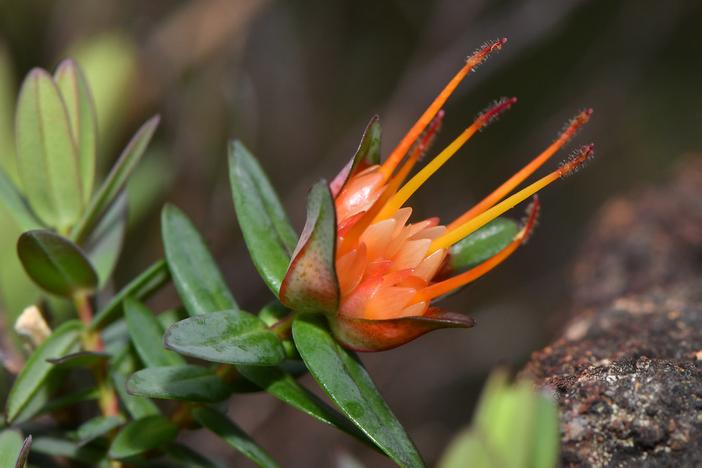Lemon-Scented Myrtle
(Darwinia citriodora)
Lemon-Scented Myrtle (Darwinia citriodora)
/
/

Jean and Fred Hort
CC BY 2.0
Image By:
Jean and Fred Hort
Recorded By:
Copyright:
CC BY 2.0
Copyright Notice:
Photo by: Jean and Fred Hort | License Type: CC BY 2.0 | License URL: https://creativecommons.org/licenses/by/2.0/ | Uploader: jeans_Photos | Publisher: Flickr





















Estimated Native Range
Summary
Darwinia citriodora, commonly known as Lemon-Scented Myrtle, is an evergreen shrub native to the open woodlands and scrublands of Southwestern Australia. It typically grows to a height and width of 1–1.5 meters (3–5 ft) and features oblong to lance-shaped leaves that are a rich green color, often turning purplish in winter. The leaves contain oil glands on their lower surface and emit a pleasant lemon scent when crushed. Darwinia citriodora is notable for its extended flowering season, with red, yellow, and orange flowers appearing in groups of four surrounded by reddish-green, leaf-like bracts from May to December. The individual flowers are small, tube-shaped, and yellow, with petals enclosing the stamens, adding a subtle ornamental value to the plant.
Lemon-Scented Myrtle is valued for its aromatic foliage and its adaptability to a range of garden settings, including urban environments and as a border planting. It is also used for its essential oils and in culinary applications for its lemon scent. This shrub is drought-tolerant once established, making it suitable for low-water gardens. It prefers part shade to full sun and soils with medium drainage. While it is generally easy to propagate from cuttings, particularly at the end of summer or early autumn, a variety with larger flowers has been developed for ornamental use. Gardeners should be aware that while it is not known for serious pest or disease problems, it may require protection from frost in cooler climates.CC BY-SA 4.0
Lemon-Scented Myrtle is valued for its aromatic foliage and its adaptability to a range of garden settings, including urban environments and as a border planting. It is also used for its essential oils and in culinary applications for its lemon scent. This shrub is drought-tolerant once established, making it suitable for low-water gardens. It prefers part shade to full sun and soils with medium drainage. While it is generally easy to propagate from cuttings, particularly at the end of summer or early autumn, a variety with larger flowers has been developed for ornamental use. Gardeners should be aware that while it is not known for serious pest or disease problems, it may require protection from frost in cooler climates.CC BY-SA 4.0
Plant Description
- Plant Type: Shrub
- Height: 2-5 feet
- Width: 3-5 feet
- Growth Rate: Moderate
- Flower Color: Green, Orange, Red
- Flowering Season: Winter, Spring
- Leaf Retention: Evergreen
Growth Requirements
- Sun: Part Shade, Full Sun
- Water: Low
- Drainage: Medium
Common Uses
Bird Garden, Butterfly Garden, Fragrant, Low Maintenance, Potted Plant, Street Planting
Natural Habitat
Open woodlands and scrublands of Southwestern Australia
Other Names
Common Names: Lemon-Scented Darwinia
Scientific Names: , Darwinia citriodora, Genetyllis citriodora, Genetyllis pimeleoides, Genetyllis pimeloides, Hedaroma latifolium,
GBIF Accepted Name: Darwinia citriodora (Endl.) Benth.